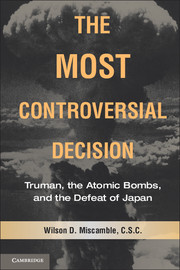Book contents
- Frontmatter
- Contents
- Acknowledgments
- Map 1 The Atomic Bombing of Japan
- Introduction: The Most Controversial Decision
- 1 Franklin Roosevelt, the Manhattan Project, and the Development of the Atomic Bomb
- 2 Harry Truman, Henry Stimson, and Atomic Briefings
- 3 James F. Byrnes, the Atomic Bomb, and the Pacific War
- 4 The Potsdam Conference, the Trinity Test, and Atomic Diplomacy
- 5 Hiroshima, the Japanese, and the Soviets
- 6 The Japanese Surrender
- 7 Necessary, But Was It Right?
- 8 Byrnes, the Soviets, and the American Atomic Monopoly
- 9 The Atomic Bomb and the Origins of the Cold War
- Suggested Readings
- Index
8 - Byrnes, the Soviets, and the American Atomic Monopoly
Published online by Cambridge University Press: 05 June 2012
- Frontmatter
- Contents
- Acknowledgments
- Map 1 The Atomic Bombing of Japan
- Introduction: The Most Controversial Decision
- 1 Franklin Roosevelt, the Manhattan Project, and the Development of the Atomic Bomb
- 2 Harry Truman, Henry Stimson, and Atomic Briefings
- 3 James F. Byrnes, the Atomic Bomb, and the Pacific War
- 4 The Potsdam Conference, the Trinity Test, and Atomic Diplomacy
- 5 Hiroshima, the Japanese, and the Soviets
- 6 The Japanese Surrender
- 7 Necessary, But Was It Right?
- 8 Byrnes, the Soviets, and the American Atomic Monopoly
- 9 The Atomic Bomb and the Origins of the Cold War
- Suggested Readings
- Index
Summary
Harry S. Truman and James F. Byrnes had little time to catch their breath as World War II ended. Pressures and demands came at them relentlessly, and they developed policies concerning the atomic bomb in circumstances where they juggled numerous other serious issues. Over the coming months and without any formal decision, Truman gravitated more to domestic politics and policies while Byrnes saw himself as the main player in the foreign policy domain. Truman hardly seemed perturbed by the division. The president had full confidence in his chosen appointee, and certainly Byrnes played a role in shaping the initial postwar approach to the American atomic monopoly. On this matter, which possessed both domestic and international dimensions, the Americans were mapping new terrain with no set rules or norms to guide them. Understanding the efforts of Truman, Byrnes, and their associates immediately after the use of the atomic bombs is important for clarifying American intentions regarding these weapons and the place they played in postwar American diplomacy. Such an examination reveals that the forceful purpose with which the Americans developed and used the atomic bombs as weapons of war was followed by much less certainty and even confusion as the Truman administration struggled to fashion the role that nuclear weapons and energy should play in the postwar era.
- Type
- Chapter
- Information
- The Most Controversial DecisionTruman, the Atomic Bombs, and the Defeat of Japan, pp. 125 - 137Publisher: Cambridge University PressPrint publication year: 2011

